Kale, the leafy green vegetable, is often referred to as a superfood due to its numerous health benefits. It is a rich source of vitamins, minerals, and antioxidants that can enhance your overall well-being. In this section, we will explore the incredible health benefits of kale, focusing on its natural detoxifying properties and its ability to protect eye health.
Key Takeaways:
- Kale is a superfood with numerous health benefits
- Kale contains essential vitamins, minerals, and antioxidants
- Kale can aid in natural detoxification and protect eye health
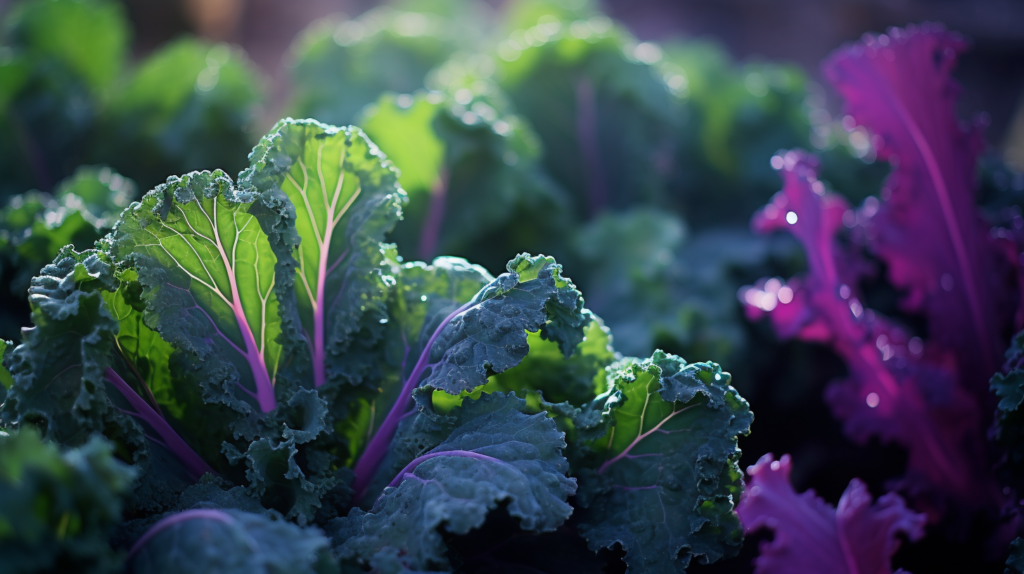
Understanding Kale’s Nutrition Facts and Superfood Status
Kale is not just any ordinary leafy green. It’s classified as a superfood, and for good reason. It’s one of the most nutrient-dense foods on the planet. One cup of raw kale, chopped, offers more than 100% of your daily recommended intake of vitamins A, C, and K, as well as a solid dose of minerals like calcium, potassium, and iron.
Kale also has a lower calorie count than most people realize, with just 33 calories per cup. This makes it an ideal superfood for those looking to lose weight without sacrificing nutrition.
But what exactly makes kale so nutrient-dense? Here are the nutrition facts:
| Nutrient | Amount per 1 cup of raw kale |
|---|---|
| Vitamin A | 206% of the Daily Value (DV) |
| Vitamin C | 134% of the DV |
| Vitamin K | 684% of the DV |
| Folate | 9% of the DV |
| Calcium | 9% of the DV |
| Potassium | 9% of the DV |
| Iron | 6% of the DV |
On top of these vitamins and minerals, kale is packed with antioxidants, including beta-carotene, flavonoids, and polyphenols. These compounds have been linked to lower risk of chronic diseases such as cancer and heart disease.
Incorporating kale into your diet is an easy way to ensure you’re getting a variety of essential vitamins and minerals. Add it to salads, smoothies, or sauté it as a side dish. With all these nutritional benefits, it’s no wonder kale is considered a superfood!
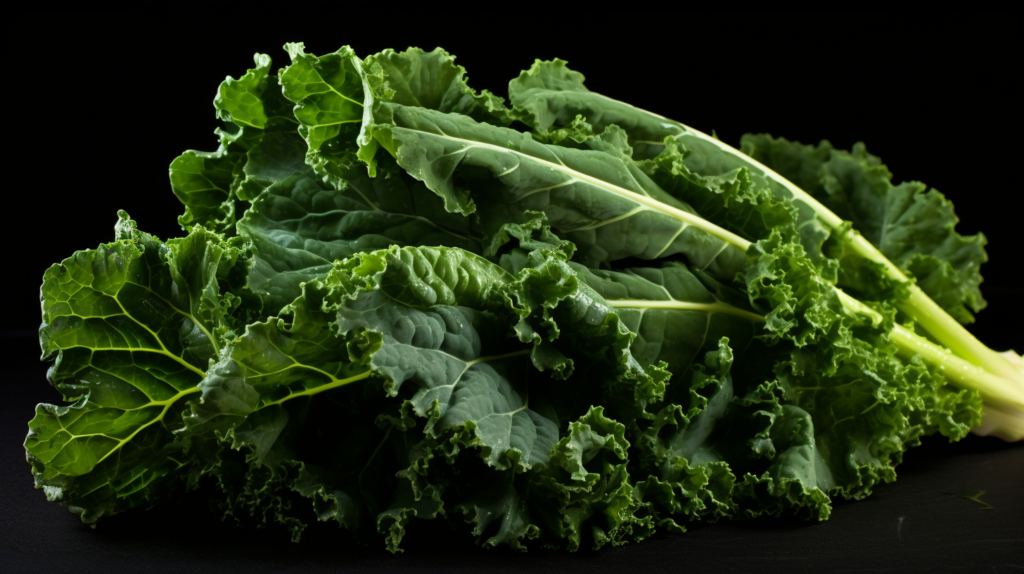
The Antioxidant Power of Kale
Kale is a rich source of antioxidants, compounds that can help protect your cells from damage caused by free radicals. Free radicals are unstable molecules that can harm your body’s cells, leading to oxidative stress, inflammation, and chronic diseases like cancer and heart disease.
Antioxidants neutralize free radicals, preventing them from causing damage to your cells. Kale contains several types of antioxidants, including:
| Antioxidant | Function |
|---|---|
| Vitamin C | Helps boost immune function, protect against infections and viruses, and supports collagen production for healthy skin and joints |
| Carotenoids (lutein and zeaxanthin) | Protects the eyes from damage caused by blue light and may reduce the risk of age-related eye diseases like cataracts and macular degeneration |
| Flavonoids (quercetin and kaempferol) | May have anti-inflammatory, anti-viral, and anti-cancer properties, helping reduce the risk of chronic diseases |
Studies have shown that kale’s high antioxidant content may reduce the risk of chronic diseases like cancer and heart disease. In addition, the antioxidants in kale may help protect your skin from UV damage and aging.
Adding kale to your diet is a simple and delicious way to boost your antioxidant intake and support overall health. Try adding kale to smoothies, salads, soups, or sautés for a nutritious and tasty meal.
Kale’s Role in Weight Loss and Digestion
If you are looking to lose weight or support healthy digestion, kale is an excellent addition to your diet. Here’s why:
Kale and Weight Loss
Kale is low in calories and high in fiber, making it an ideal food for weight loss. One cup of raw kale contains only 33 calories and 2.6 grams of fiber, which can help you feel fuller for longer periods, reducing your overall calorie intake. The fiber in kale also helps to regulate digestion and prevent overeating, which can further contribute to weight loss.
In addition to being low in calories and high in fiber, kale also contains compounds that have been shown to aid in weight loss. One such compound is sulforaphane, which can increase the activity of fat-burning enzymes in the body and reduce the formation of fat cells.
To incorporate kale into your weight loss plan, try adding it to salads, smoothies, or stir-fries. Alternatively, try using kale leaves as a substitute for bread or tortillas in sandwiches or wraps.
Kale and Digestion
Kale is an excellent source of fiber, which is essential for maintaining healthy digestion. One cup of raw kale contains 2.6 grams of fiber, which can help to prevent constipation, bloating, and other digestive issues. The fiber in kale also feeds the healthy bacteria in your gut, which can help to improve overall gut health.
Kale also contains compounds that can help to soothe inflammation in the gut, which can further support healthy digestion. One such compound is glucosinolates, which has been shown to reduce inflammation in the gut and improve overall gut health.
To incorporate kale into your diet for digestive health, try adding it to soups, stews, or casseroles. You can also try sautéing it as a side dish or using it as a topping for baked sweet potatoes.
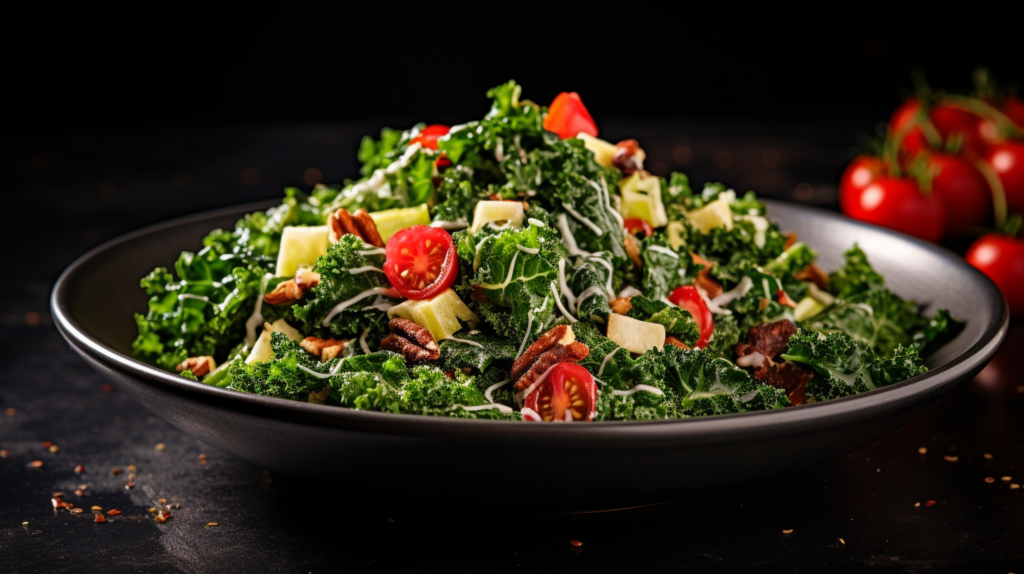
Boosting the Immune System with Kale
Did you know that kale can help strengthen your immune system? This leafy green is packed with vitamins and minerals that support immune function. Incorporating kale into your diet can help keep you healthy and ward off illness.
Kale is a rich source of vitamin C, a powerful antioxidant that helps protect cells from damage caused by free radicals. Vitamin C also helps to boost the immune system by stimulating the production of white blood cells, which are responsible for fighting off infections.
In addition to vitamin C, kale also contains vitamin A, which supports the immune system by helping to maintain the health of tissues such as the skin and respiratory system. Vitamin K, another nutrient found in kale, has been shown to have anti-inflammatory effects, which can also benefit the immune system.
Studies have also suggested that the antioxidants found in kale may have a role in preventing chronic diseases such as heart disease and cancer, further contributing to overall health and wellness.
To reap the benefits of kale for your immune system, try incorporating it into your meals in a variety of ways. Add it to salads, smoothies, or sauté it as a tasty side dish. Aim to include kale in your diet on a regular basis to support your immune system and maintain good health.
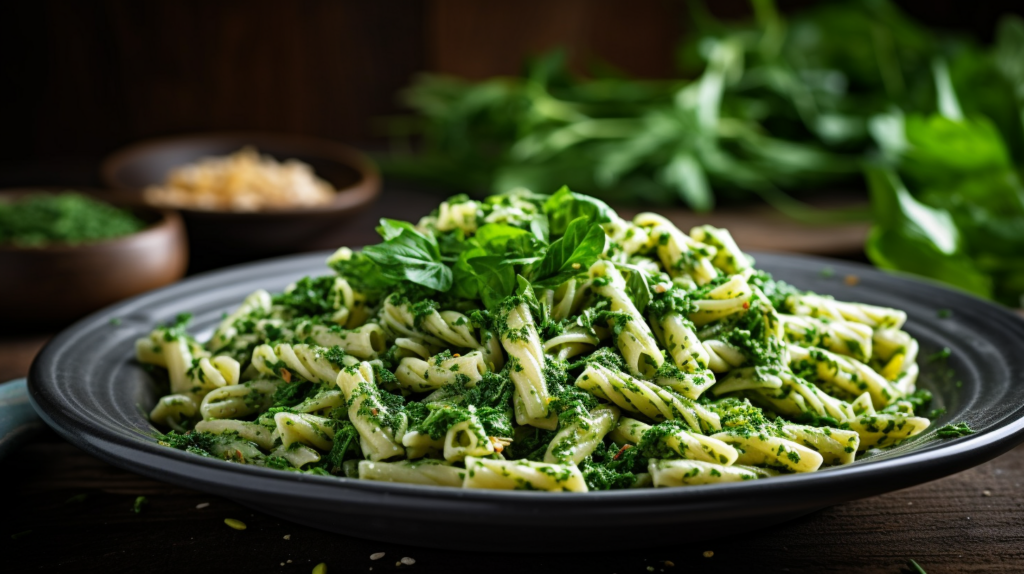
Kale’s Anti-Inflammatory Properties
Kale is an excellent source of anti-inflammatory compounds, which makes it an ideal food to include in your diet if you suffer from chronic inflammation. This inflammation can lead to numerous health problems, including arthritis, heart disease, and cancer.
The anti-inflammatory properties of kale come from its high content of flavonoids and carotenoids, which act as antioxidants and can help reduce inflammation in the body. One of the most important anti-inflammatory compounds in kale is kaempferol, which has been linked to a reduced risk of chronic diseases.
Incorporating kale into your diet can help reduce inflammation and improve your overall health. Try adding kale to salads, stir-fries, or smoothies for a delicious and nutritious way to boost your intake of anti-inflammatory compounds.
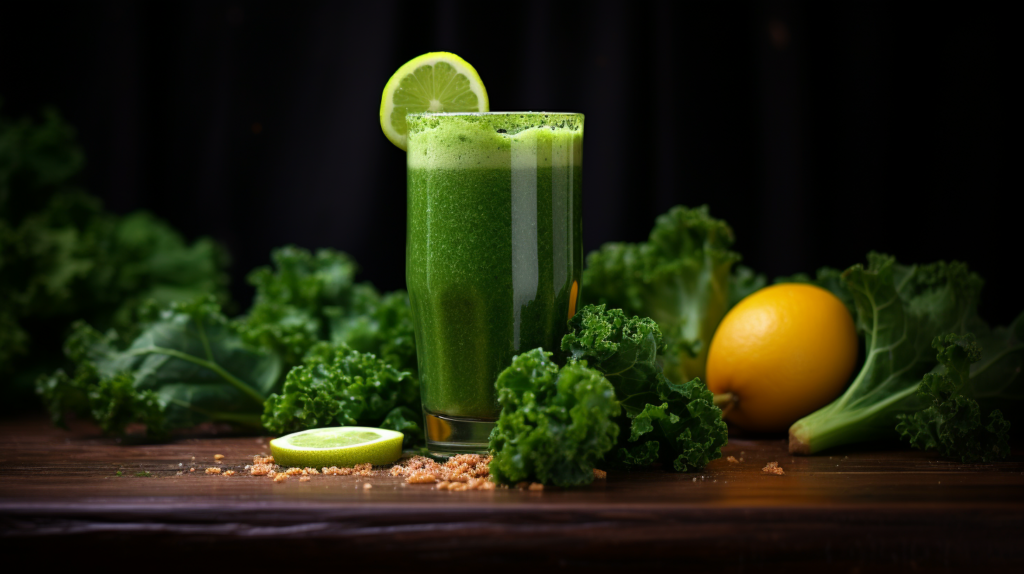
Delicious Kale Recipes to Incorporate into Your Diet
Kale is an incredibly versatile leafy green, making it a delicious addition to any meal. Here are some kale recipes to inspire you to incorporate this nutrient-packed superfood into your diet:
1. Kale Salad with Lemon Dressing
Start by washing and chopping up your kale leaves. Mix in some cherry tomatoes, thinly sliced red onion, and chopped cucumber. Top with some crumbled feta cheese and almonds for crunch. For the dressing, mix together some lemon juice, olive oil, and honey. Drizzle the dressing over the salad and enjoy!
2. Kale and White Bean Soup
In a large pot, sauté some chopped onions and garlic in olive oil until softened. Add in chopped kale leaves, a can of white beans, and some vegetable broth. Simmer until kale is tender, then season with salt and pepper. Serve hot with crusty bread.
3. Kale Pesto Pasta
Cook your favorite pasta according to package instructions. In a food processor, blend together kale leaves, garlic, pine nuts, parmesan cheese, and olive oil until smooth. Toss the pesto with the cooked pasta and enjoy!
4. Kale Smoothie
Blend together some kale leaves, frozen pineapple chunks, banana, and coconut milk for a refreshing and nutritious smoothie. Add in some protein powder or chia seeds for an extra boost.
There are endless possibilities for incorporating kale into your meals. Try adding it to soups, stews, stir-fries, and more. Get creative and enjoy the numerous health benefits of this amazing superfood!
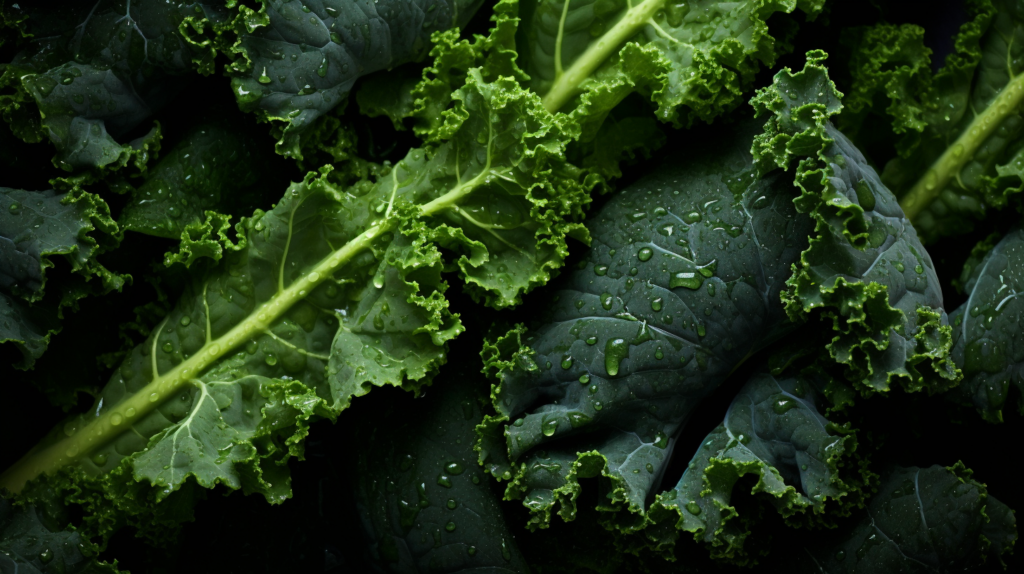
The Wonder of Kale Vitamins
Kale is a powerhouse of vitamins, making it a nutritious addition to any diet. Here are some of the key vitamins found in kale and how they contribute to overall health:
| Vitamin A | Kale is an excellent source of vitamin A, which supports healthy vision, skin, and immune function. |
|---|---|
| Vitamin C | Kale is also high in vitamin C, an antioxidant that helps protect against immune system deficiencies, cardiovascular disease, and eye disease. |
| Vitamin K | Kale is one of the best dietary sources of vitamin K, which promotes healthy blood clotting and contributes to bone health. |
| Vitamin B6 | Vitamin B6 helps the body produce neurotransmitters, such as serotonin and norepinephrine, which regulate mood and improve brain function. |
| Vitamin E | Kale contains vitamin E, an antioxidant that helps protect cells from damage and may reduce the risk of certain cancers. |
Incorporating kale into your diet can help ensure you are getting these essential vitamins in your daily nutrition intake. For example, a one-cup serving of kale contains over 200% of the recommended daily value of vitamin A and over 100% of the recommended daily value of vitamin C.
It’s important to note that while kale is a great source of vitamins, it should not be relied on as the sole source of any one nutrient. A balanced diet should include a variety of nutrient-dense foods to ensure all vitamin needs are met.
Incorporating Kale into a Healthy Lifestyle
To fully reap the health benefits of kale, it is essential to incorporate it into your daily diet. Fortunately, this nutritious leafy green can be easily added to a variety of meals and snacks.
Ideal Serving Sizes
When incorporating kale into your diet, aim for at least 1-2 cups per day. This can be in the form of raw kale in a salad, sautéed kale as a side dish, or blended into a smoothie.
Possible Variations in Preparation
Kale can be prepared in numerous ways to suit your tastes and preferences. Some delicious options include kale chips, kale pesto, and kale soup. Experiment with different cooking methods and flavor combinations to find what works best for you.
The Importance of Balance
While kale is a highly nutritious food, it should be consumed as part of a balanced and varied diet. Incorporating a variety of fruits, vegetables, whole grains, and lean proteins will ensure that you are meeting all of your nutritional needs.
By incorporating kale into your diet on a regular basis and maintaining a healthy lifestyle, you can experience the numerous health benefits that this superfood has to offer. From reducing inflammation and boosting the immune system to aiding in weight loss and supporting healthy digestion, kale truly is a powerhouse of nutrients.
So next time you’re at the grocery store, be sure to grab a bunch of fresh kale and start incorporating it into your meals. Your body will thank you for it!
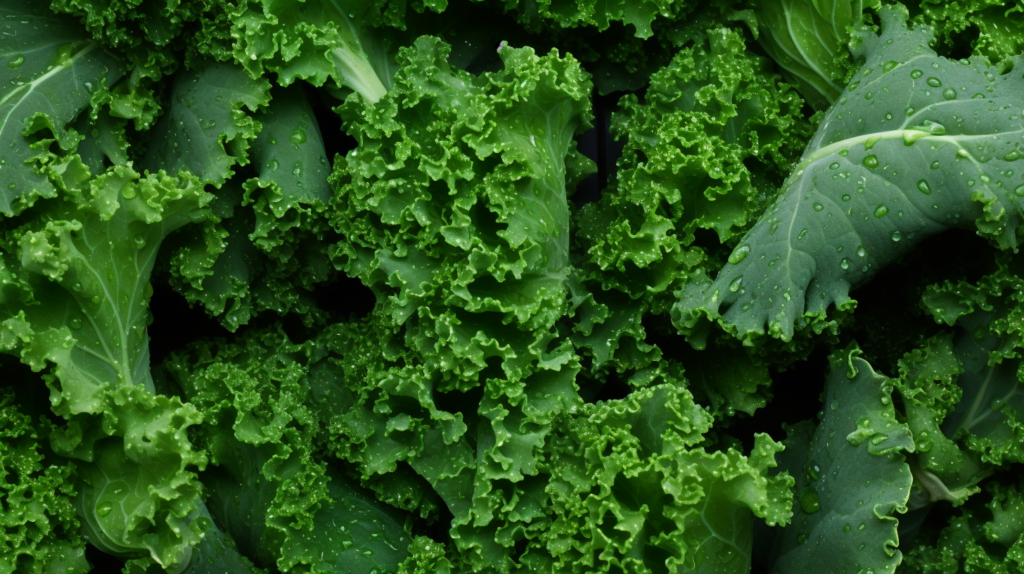
FAQ
Q: What are the health benefits of consuming kale?
A: Kale has natural detoxifying properties and can protect eye health.
Q: What are kale’s nutrition facts and why is it considered a superfood?
A: Kale is rich in nutrients and vitamins, making it a superfood with numerous health benefits.
Q: How does kale contribute to antioxidant power?
A: Kale is packed with antioxidants that combat oxidative stress and reduce the risk of chronic diseases.
Q: Can kale help with weight loss and digestion?
A: Yes, kale’s fiber content and other compounds support weight loss and aid in healthy digestion.
Q: Does kale boost the immune system?
A: Kale contains vitamins and minerals that strengthen the immune system and promote overall wellness.
Q: What are kale’s anti-inflammatory properties?
A: Kale contains compounds that have potential anti-inflammatory effects, helping to reduce inflammation in the body.
Q: Can you provide some delicious kale recipes?
A: Yes, we have a selection of kale recipes including salads, smoothies, and sautés.
Q: What vitamins are found in kale and how do they benefit health?
A: Kale is rich in vitamins that support various bodily functions and promote overall health.
Q: How can I incorporate kale into a healthy lifestyle?
A: We provide practical tips on serving sizes, preparation variations, and the importance of balance in a nutritious diet.
Q: What are the main health benefits of kale?
A: Kale has natural detoxifying properties and can protect eye health, among other benefits.














